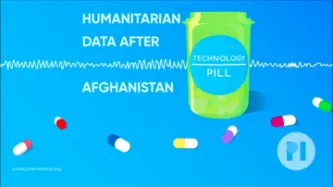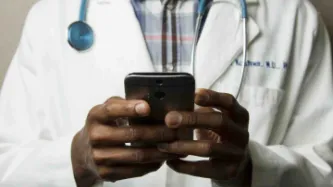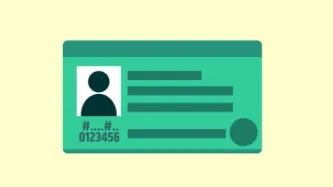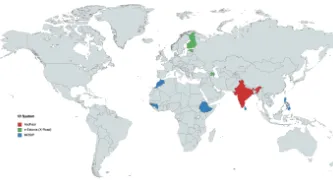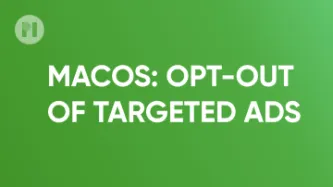Search
Content type: Examples
A welfare benefit being rolled out in Nigerian in response to Covid-19 reportedly relies on highly data-intensive techniques.
The Rapid Response Registration Cash Transfer Project was set up by the Nigerian government to provide support to poor Nigerians located in urban and semi-urban areas that were not receiving any other form of welfare support.
According to statements by the Nigerian vice-president, the Rapid Response Register uses "scientifically validated methods of satellite remote…
Content type: Examples
A third-party, privately-owned electronic wallet platform is being used to disburse welfare benefits in Honduras.
The Single Voucher is a one-time subsidy delivered through an electronic voucher that can be exchanged for food, medicine and /or medical supplies.
The benefit is disbursed in the form of a voucher that can be used in authorised establishments, namely supermarkets, pharmacies, grocery stores throughout the country. According to a Powerpoint presentation by the WHO and Honduran…
Content type: Examples
A welfare benefit introduced by the Peruvian government not only relies on unclear eligibility criteria, but has been shown to exclude many.
Peru's Stay at Home bonus targets 2.7 million poor and non-extreme poor households. Those eligible are identified through the National Household Register, which categorises households into different bands. Among other factors, households categorised by the Register as being in poverty are deemed eligible to the benefit. However, the criteria used to…
Content type: Examples
In 2020, after the COVID-19 pandemic hit Mozambique, the government started implementing the National Response Plan of Social Protection which aims to provide cash transfers to 1,582,179 beneficiaries.
The selection of priority areas to enroll people was based on a multimethodological approach using the MultiDimensional Poverty Index mapping that combines social and economic indicators. The index relied on the data gathered in the recent census, as well as high resolution satellite imaginary…
Content type: Examples
Kwenda is a social protection program started in Angola in May 2020 to support people affected by the Covid-19 pandemic and it is expected to last for 3 years. The program counts with 420 million USD funding from the World Bank and has 4 distinct components.
Besides aiding with the effects of the pandemic, the Angolan government additionally sees KWENDA as a way to increase banking and digital inclusion for populations. This digitisation includes the creation of a centralised database under…
Content type: Long Read
For over 20 years with the start of the first use of ICTs in the 1990s, we have seen a digital revolution in the health sector. The Covid-19 pandemic significantly accelerated the digitalisation of the health sector, and it illustrates how fast this uptake can be and what opportunities can emerge; but also, importantly, the risks that it involves.
As we've said many times before, whilst technologies can be part of the solution to tackle some socio-economic and political challenges facing our…
Content type: Examples
As a response to the current pandemic, Malawi has set an emergency welfare support programme aiming at delivering cash for a three to four months period to vulnerable households. The International Labour Organization and the World Food Programme have designed a mechanism to select which neighbourhoods most needed support. The mechanism was created based on data analysis, consultations with local councils and satellite data to identify "poverty hot spot." Beneficiaries can contact a call centre…
Content type: Advocacy
The Office of the Privacy Commissioner of Canada has developed draft privacy guidance for police agencies' use of FRT, with a view to ensuring any use of FRT "complies with the law, minimizes privacy risks, and respects privacy rights". The Commissioner is undergoing consultation in relation to this guidance.
Privacy International and the Canadian Civil Liberties Association ("CCLA") welcome the Commissioner's efforts to strengthen the framework around police use of facial recognition, and the…
Content type: Examples
As part of a collaboration with Unicef and the World Bank, the Malagasy government launched Tosika Fameno. Tosika Fameno is an unconditional cash transfer programme aiming to support 189,400 households affected by the pandemic. The benefit aims to address the needs of citizens in vulnerable situations from the town of Antananarivo, Moramanga, Toamasina and Fianarantsoa, where lockdown measures were put in place.
However, the way beneficiaries were chosen could raise questions when it comes to…
Content type: Examples
The 20 years since the 9/11 attacks have fundamentally changed the way the New York Police Department operates, leading it to use facial recognition software, licence plate readers, and mobile X-ray vans, among other surveillance tools for both detecting and blocking potential terrorist attacks and solving minor crimes. Surveillance drones monitor mass protests, antiterrorism officers interrogate protesters, and the NYPD’s Intelligence Division uses antiterror tactics against gang violence and…
Content type: Examples
Clashes between police and lockdown protesters have spawned reports of police brutality in Greece. Mobile phone footage of one such protest in March 2021 suggested that the police are using drones to surveil the protests, and some of those remanded have complained that they’ve been beaten and subjected to threats and sexual harassment while in custody. Disinfaux Collective has identified an individual caught on video throwing a petrol bomb as “either a police officer of the DRASI unit… or,under…
Content type: Examples
The Myanmar military are stopping people in the street, checking through the data on their phones, and taking them to jail if they find suspicious messages or photos. At least 5,100 people were still in jail many months after opposing the February 1, 2021 military takeover. The spontaneous searches also deter individuals from continuing to post on social media or lead them to create new accounts they hope will evade detection, and avoid crowded streets where police or soldiers are likely to be…
Content type: Examples
July 2021 saw violent protests that left 72 people dead and 1,300 in prison after former president Jacob Zuma was jailed for failing to appear before a constitutional court’s inquiry into corruption during his time in office. In response, the South African government deployed the military onto the streets in the provinces of Gauteng and Kwazulu Natal, and began monitoring social media platforms and tracking those who “are sharing false information and calling for civil disobedience”. President…
Content type: Examples
The South African government urged social media platforms to trace and remove posts that incite violence, share false information, and call for civil disobedience after a July 2021 series of spiralling protests sparked by the jailing of former president Jacob Zuka. A number of other African countries such as eSwatini, Senegal, Nigeria, Uganda, Niger, and the DRC have also been increasingly using tracking software, internet shutdowns, and social media monitoring during protests and elections.…
Content type: Examples
Following the largest protests seen on the island in decades, Cuba’s government introduced new social media regulations that make inciting acts that alter public order a crime, and ordered ISPs to shut off access for those who “spread fake news or hurt the image of the state”. Critics believe the new rules are intended to curb dissent, as the protests spread across the island from a small town, where the first protest was convened in an online forum and spread via a Facebook livestream. Deputy…
Content type: Examples
The global internet monitoring firm NetBlocks finds that Cuba has restricted access to social media and messaging platforms including Facebook, Instagram, and WhatsApp, as well as some Telegram servers, on the govt-owned telecom provider ETECSA during the largest protests the country has seen in decades. Access to the streaming services YouTube and Google Video was also limited. The protests focused on rising prices, curbs on civil liberties, and the government’s handling of the pandemic.…
Content type: Examples
Israel is abandoning its longstanding tactic of raiding Palestinian homes for “intelligence mapping” in favour of digitised surveillance that includes a vast and sophisticated 20-year-old network of CCTV, ANPR, and IP cameras throughout the Old City in East Jerusalem (“Mabat 2000”), automated facial recognition-equipped checkpoints (provided by the domestic company AnyVision) between Israel and the occupied West Bank, and drone surveillance at Palestinian protests. The drones over weekly…
Content type: Explainer
With more and more connected devices around us, the chance that you've been hit by an update notification is high. But what do these software updates do? How do they actually work, and why are they important?
Hardware and Software
Modern electronic devices require two main parts to function: the hardware and the software. The hardware usually refers to physical electronic pieces inside a device (usually a collection of microchips, logic gates and specialised processing chips, such as those to…
Content type: Advocacy
Our environment is increasingly populated by devices connected to the Internet, from computers and mobile phones to sound systems and TVs to fridges, kettles, toys, or domestic alarms. There has been research into the negative safety and privacy impacts of inadequate security provided by the software in such devices (such as the creation of large scale botnets). This is also the case with outdated security, a risk enabled by software support periods that are shorter than a product’s usable life…
Content type: Video
<br />
Links
Find out more about PI's work with and on humanitarian organisations uses of data here: https://privacyinternational.org/learn/humanitarian-sector
Read more about the Humanitarian Metadata Problem in our report on doing no harm in the digital age co-authored with the ICRC here: https://privacyinternational.org/report/2509/humanitarian-metadata-problem-doing-no-harm-digital-era
And you can learn more about the history of…
Content type: Long Read
Image source
This piece is a part of a collection of research that demonstrates how data-intensive systems that are built to deliver reproductive and maternal healthcare are not adequately prioritising equality and privacy.
Telemedicine describes the vast range of applications and technologies used to provide and manage healthcare remotely.
Telemedicine as its most basic refers to the transmission of data from a patient to a healthcare professional through a range of electronic…
Content type: Case Study
This written piece is part of PI's wider research into the tech behind ID systems around the world. Click here to learn more.
Overview
The Modular Open Source Identity Platform (MOSIP) is an open source, open standards based foundational identity platform. MOSIP is an API first platform that can be used by user organisations such as Governments to build their own foundational national ID platforms. MOSIP offers ID life-cycle management features and identity verification capabilities out of the…
Content type: Long Read
Governments around the world are increasingly making registration in national digital ID systems mandatory for populations, justifying its need on a range of issues from facilitating access to services, to national security and fighting against corruption. This is an attempt to create a "foundational identity" for an individual, or "a single source of truth" about who someone is, according to a government agency. These identity systems are run by governments, sometimes by private companies, or…
Content type: News & Analysis
Update: Based on the complaint, on 30 November 2021 the Ombudsman opened an inquiry into whether the European Commission failed to take into account human rights concerns or carry out human rights impact assessments before providing support to African countries to develop surveillance capabilities.
___
Privacy International (PI) together with a coalition of human rights groups have today called on the European Ombudsman, the EU’s oversight body, to investigate evidence that the block is…
Content type: Long Read
In early August, the African Union (AU) issued a statement condemning Denmark’s Aliens Act which, among other things, allows Demark to relocate asylum seekers to countries outside the European Union while their cases are being processed.
The AU argues that this amounts to an abdication by Denmark of “…its international responsibility to provide asylum and protection to those that enter its territory…’’ More importantly, the AU says this is an “extension of the borders of such countries and an…
Content type: Guide step
El identificador de publicidad es un identificador único que ofrece el sistema operativo MacOS y que los anunciantes pueden utilizar para identificarte con precisión. Facilita que los anunciantes o las empresas que comercian con datos puedan crear un perfil que posteriormente puede ser usado para personalizar la publicidad o para otros fines.
Cómo desactivar la publicidad personalizada
Ya hemos escrito con anterioridad sobre los riesgos que los anuncios personalizados suponen para tu privacidad…
Content type: Guide step
Configuración
En internet, las solicitudes de acceso a sitios web se dirigen a direcciones IP. Dado que las direcciones IP son difíciles de recordar, solemos dirigirnos a los hosts por su nombre (por ejemplo, privacyinternational.org). Por eso, y porque las direcciones IP pueden cambiar con frecuencia, cuando tu computador quiere acceder a un servidor por el nombre del host, le pregunta a un servidor DNS cuál es la dirección IP de ese nombre del host, para poder enrutar la solicitud.…
Content type: Guide step
Introducción
Pi-hole es un bloqueador de anuncios de uso general que cubre toda la red y la protege de los anuncios y los rastreadores sin que sea necesario configurar cada uno de los dispositivos. Tiene la capacidad de bloquear anuncios en cualquier dispositivo de la red (por ejemplo, electrodomésticos inteligentes) y, a diferencia de las extensiones del navegador, Pi-hole bloquea los anuncios en cualquier tipo de software.
La configuración general funciona de la siguiente manera (Fig. 1).…





